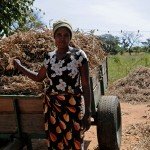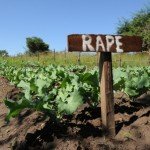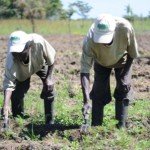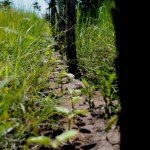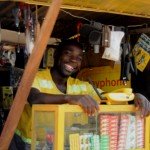Sitting on a small stool in the shade of her home, Mary Mumba points to her crop of soya beans piled high in a scotch cart, spilling out into the spotless yard. “We struggle to find a market for soya,” she says. An enterprising small-scale farmer near the town of Mumbwa, 140 kilometres west of Zambia’s capital Lusaka, Mary’s six-hectare farm has come a long way since small beginnings. Using a community pay phone installed by Connect Africa some years back, she has since established markets in town and supplies maize and soya to them on a regular basis. But what disturbs Mary’s business more than a limited market in town for her soya is the lack of information available about what to grow instead, especially in an increasingly unpredictable climate.
“I grow cotton, groundnuts, maize and soya,” she explains. “This year, our crop was not very good as we didn’t have much rain. If we had planted certain bean varieties, then harvest would have been better, but we didn’t know about the beans, and we didn’t know that the rains would be so little,” she said.
Relying on rain-fed agriculture and farming only common staple crops are widespread practices among small scale farmers across Zambia. Apart from producing narrow market potential, growing only a few specific crops also creates gluts on local markets at harvest time, driving down prices. Key to addressing these challenges is to diversifying produce – and to supply farmers with options.
Making technology work for the poor
Connect Africa’s core business is to provide communication platforms like mobile phones in rural areas. Enterprising individuals can benefit directly by using the communication services, or make a profit by selling mobile phone services or airtime, ploughing the profits back into their business. With the majority of stakeholders living on the outskirts of Mumbwa engaged in farming, Connect Africa now provides farmers with new information about agricultural methods, techniques and markets.
As Dion Jerling, Connect Africa’s Director, explains: “Communication gives farmers a sense of awareness so they can make informed decisions about how they farm sustainably. We are taking our usual work a step further, expanding on knowledge about agriculture, a vital lifeline for rural communities. This is part of our philosophy of delivering an all-encompassing service in deep rural areas,” he said.
The result is Kutenda Farm, a trial plot demonstrating sustainable organic agricultural practises and permaculture methods. Country coordinator, Lloyd Kabulwebulwe, explains: “This demonstration plot also shows that planting a wide variety of quality crops opens
up new market opportunities. Communication will be vital to improve the entire agricultural value addition chain from what to grow, how to grow it, and where to sell it, and this will be demonstrated throughout,” he said.
Information highway at Kutenda Farm
Farm technician and supervisor, Victor Chinda, is clearly passionate about the philosophy behind the farm, and outlines what it means to engage in permaculture and environmentally friendly methods of farming. Stepping enthusiastically between neat green rows of lettuce and beans, he beams: “There is an emphasis on showing local communities that they can grow non-traditional crops like peppers, chillies and other herbs and spices which will fetch a higher price at the market, with minimal amounts of money for fertilisers and pesticides.“There is a mulching system in place, where grass is placed on top of crop ridges to retain moisture, replace nutrients to the soil and suppress weeds,” he continues. “We also plant vegetables to repel insects, like chilli, so we don’t have to use chemical fertilisers, and we harvest water in a pond so we don’t rely on rainfall which is increasingly unpredictable.” The farm uses old tyres as miniature nurseries, filled with elephant dung or rich compost from the wormary. And trees are planted, intercropped among crops, so that leaves form a rich bed of compost when they fall.
Bagging big markets
The healthy produce is courting the attention of communities in surrounding areas. Langson Tobolo, a farm volunteer, said: “I didn’t know certain types of plants repel insects, and some vegetables, like eggplant, I had never heard of.” He is now learning how to grow and harvest this produce, so that he can grow it on his own farm and boost the income for his family, as well as their food security.
Connect Africa’s aim is to give these small scale farmers the ability to link themselves directly with bigger markets – first by providing the communication technology and network to get in touch, and then by supplying the information needed to get the product right for the market. “Our aim is to roll out network-coverage country-wide, allowing small scale farmers to readily communicate their needs, putting the power in their hands to boost their own incomes,” said Dion.
With a luxurious lodge in the Kafue National Park already keen to source Kutanda’s fresh and organic produce as an alternative to shops in Lusaka, farmers at Kutenda won’t have to worry about where to sell their produce in future. It just goes to show that being able to communicate – and having the right information – pays.

